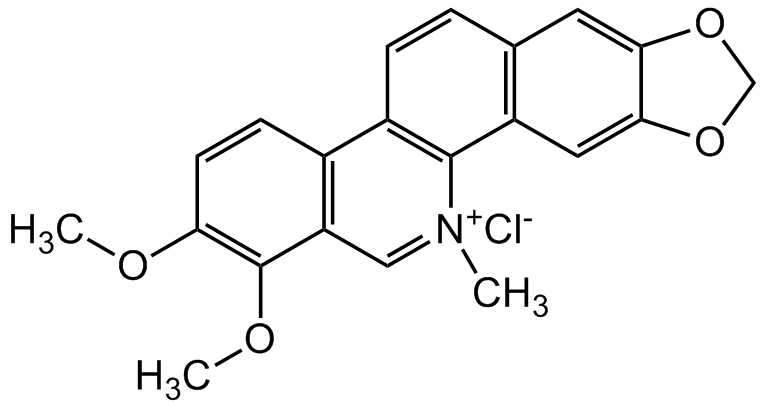
Chemical Structure
Chelerythrine chloride [3895-92-9]

AG-CR1-0071
Overview
- SupplierAdipoGen Life Sciences
- Product NameChelerythrine chloride [3895-92-9]
- Delivery Days Customer10
- CertificationResearch Use Only
- Estimated Purity>98% (NMR)
- Hazard InformationNon-hazardous,Warning
- Molecular FormulaC21H18ClNO4
- Molecular Weight383.8
- Scientific DescriptionCell permeable potent inhibitor of protein kinase C. Does not inhibit tyrosine protein kinases, cAMP-dependent protein kinase or calcium/calmodulin-dependent protein kinase [1, 5]. Antiplatelet, anti-inflammatory, antibacterial and antitumor compound [1, 2, 9, 12, 15]. Apoptosis inducer in cancer cells in vitro and in vivo [3, 9]. Activates MAPK and JUNK signaling pathways [4, 8]. Affects translocation of PKC from cytosol to plasma membrane [6]. Neurite outgrowth stimulator [7]. Inhibits binding of BclXL to Bak (IC50 = 1.5 microM) or Bad proteins and stimulates apoptosis in several cancer cell lines [10, 13]. Blocks human P2X7 receptor [11]. Induces cell cycle arrest in G1 phase [14]. Specific cyclooxygenase-2 inhibitor [15]. - Chemical. CAS: 3895-92-9. Formula: C21H18ClNO4. MW: 383.8. Cell permeable potent inhibitor of protein kinase C. Does not inhibit tyrosine protein kinases, cAMP-dependent protein kinase or calcium/calmodulin-dependent protein kinase. Antiplatelet, anti-inflammatory, antibacterial and antitumor compound. Apoptosis inducer in cancer cells in vitro and in vivo. Activates MAPK and JUNK signaling pathways. Affects translocation of PKC from cytosol to plasma membrane. Neurite outgrowth stimulator. Inhibits binding of BclXL to Bak (IC50 = 1.5 microM) or Bad proteins and stimulates apoptosis in several cancer cell lines. Blocks human P2X7 receptor. Induces cell cycle arrest in G1 phase. Specific cyclooxygenase-2 inhibitor.
- SMILES[Cl-].COC1=C(OC)C2=C(C=C1)C1=C(C3=C(C=C1)C=C1OCOC1=C3)[N+](C)=C2
- Storage Instruction2°C to 8°C,-20°C
- UNSPSC12352200
References
- Chelerythrine is a potent and specific inhibitor of protein kinase C: J.M. Herbert, et al.; BBRC 172, 993 (1990)
- Antiplatelet effects of chelerythrine chloride isolated from Zanthoxylum simulans: F.N. Ko, et al.; Biochim. Biophys. Acta 1052, 360 (1990)
- Induction of apoptotic DNA fragmentation and cell death in HL-60 human promyelocytic leukemia cells by pharmacological inhibitors of protein kinase C: W.D. Jarvis, et al.; Cancer Res. 54, 1707 (1994)
- Role of c-jun in human myeloid leukemia cell apoptosis induced by pharmacological inhibitors of protein kinase C: A.J. Freemerman, et al.; Mol. Pharmacol. 49, 788 (1996)
- Angoline and chelerythrine, benzophenanthridine alkaloids that do not inhibit protein kinase C: S.K. Lee, et al.; J. Biol. Chem. 273, 19829 (1998)
- Inhibition of protein kinase C translocation from cytosol to membrane by chelerythrine: M.D. Chao, et al.; Planta Med. 64, 662 (1998)
- Axonal transport is inhibited by a protein kinase C inhibitor in cultured isolated mouse dorsal root ganglion cells: H. Hiruma, et al.; Brain. Res. 826, 135 (1999)
- Activation of p38 and c-Jun N-terminal kinase pathways and induction of apoptosis by chelerythrine do not require inhibition of protein kinase C: R. Yu, et al.; J. Biol. Chem. 275, 9612 (2000)
- In vitro and in vivo activity of protein kinase C inhibitor chelerythrine chloride induces tumor cell toxicity and growth delay in vivo: S.J. Chmura, et al.; Clin. Cancer Res. 6, 737 (2000)
- Identification of chelerythrine as an inhibitor of BclXL function: S.L. Chan, et al.; J. Biol. Chem. 278, 20453 (2003)
